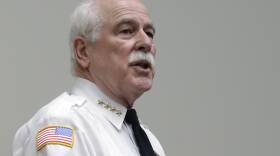EXPLORE MORE
Coming up Tuesday on BPR, live from the BPL:
"Ask the Mayor" with Michelle Wu, 12-1pm
CNN's John King
NBC Sports Boston's Trenni Casey
Recent segments
-
Carol Rose: An Independent Investigation Is Needed In Bristol County Jail Incident
"We're hoping they make the surveillance tapes available," says executive director of ACLU of Massachusetts. -
Andrew Yang On Why The Stimulus Checks Aren't Enough
The presidential candidate who ran on the promise of a universal basic income is calling for recurring checks during the coronavirus pandemic. -
'Social Distancing Is Impossible' In Meat Packing Plants, Says Corby Kummer
Working conditions within meat packing plants require close quarters to colleagues, says Kummer. -
Charlie Sennott: ‘It’s Time to Fight Like Hell’ To Protect Press Freedom
The WGBH news analyst weighed in on the myriad of factors threatening journalism both in the U.S. and around the world. -
Travel Writer Rick Steves, Grounded By The Coronavirus, Says 'There's More To Life Than Being Productive'
Steves is stuck at home for now, but is keeping his company going so they can jump right back in when pandemic passes. -
'Never Have I Ever' Show Is 'Perfect' For Uncertain Times, Says Bob Thompson
The charming new Netflix show is a comforting during the pandemic, Thompson says.
Listen to previous shows
-

BPR Full Show: Turkey Talk in "Turkey Town"
Today on Boston Public Radio: We began the show by talking about U.S. hypocrisy in criticizing homophobic laws in Qatar, after a mass shooting at a gay nightclub in Colorado Springs and rising anti-LGBTQ+ animus nationwide. Shannon Liss-Riordan discussed the multiple lawsuits she’s filed on behalf of Twitter employees alleging illegal firing practices after Elon Musk’s purchase of the social media platform. Liss-Riordan is an attorney and former candidate for Massachusetts Attorney General. Bill McKibben shared his thoughts on the U.N. deal to pay vulnerable nations for the damaging impacts of climate change. McKibben is an author, educator and environmentalist. He’s the co-founder of 350.org and founder of ThirdAct.org. He has a newsletter on Substack titled “The Crucial Years.” He’s also got a new, serialized book titled: “The Other Cheek: An Epic Nonviolent Yarn.” Aynsley Floyd and John Moran joined us to talk about the rise of wild turkeys in Boston, and Floyd’s recent documentary, “Turkey Town.” Floyd is a photographer and filmmaker. Moran is a mail carrier whose father was behind repopulation efforts of wild turkeys in Mass. The 30 minute documentary “Turkey Town” airs at 9 p.m. this Thanksgiving on GBH 2, and on Friday at 1 P.M. on GBH 44. Revs. Irene Monroe and Emmett G. Price III discussed a mass shooting at Club Q, an LGBTQ+ nightclub in Colorado Springs. Price is founding pastor of Community of Love Christian Fellowship in Allston, the Inaugural Dean of Africana Studies at Berklee College of Music. Monroe is a syndicated religion columnist and the Boston voice for Detour’s African American Heritage Trail. Together they host the “All Rev’d Up” podcast. James Bennett II, Brian McCreath, and Brian O’Donovan joined us for the return of BPR’s music roundtable, sharing their top music picks for the month. Bennett is a GBH News culture reporter. McCreath produces the Boston Symphony Orchestra Broadcasts, and hosts “The Bach Hour” on WCRB which you can hear Sundays and Mondays on 99.5 FM or online. O’Donovan hosts “A Celtic Sojourn” on GBH 89.7. We ended the show by talking with listeners about their love-hate relationships with turkeys. -

BPR Full Show: "Ask the Mayor" with Mayor Michelle Wu
Today on Boston Public Radio: Mayor Michelle Wu discussed her new homeownership plan amid rising housing prices in Boston, and talked about the reopening of Boston City Hall Plaza after numerous renovations. She also took questions from listeners during this month’s edition of “Ask the Mayor.” Callie Crossley talked about chaos at Twitter after Elon Musk called on employees to commit “hardcore” or resign with severance pay, and Naomi Biden’s wedding at the White House. Crossley is the host of GBH's Under the Radar. Sue O’Connell shared her thoughts on House Speaker Nancy Pelosi’s decision to not seek reelection, and Tom Brady giving a portion of donations received by his nonprofit TB12 Foundation to his for-profit company, TB12, Inc. O’Connell is the co-publisher of Bay Windows and South End News, and contributor to Current on NBC LX and NECN. Joanne Chang talked about baking ahead of the holiday season. Chang is a James Beard Award–winning pastry chef and owner of the Cambridge bakery and cafe Flour. Ray Angry and Jonathan McPhee joined us for “Live Music Fridays” at the Boston Public Library, talking about Angry’s first symphony, “Black Power - Athena” in partnership with the Lexington Symphony. Angry is composer and pianist for The Roots – the house band over at NBC’s Tonight Show with Jimmy Fallon. McPhee is the music director for the Lexington Symphony Orchestra. We ended the show by talking with listeners about their favorite Thanksgiving desserts. -

BPR Full Show: Mahogany Gloss
Today on Boston Public Radio: We began the show by talking with Arlene Isaacson about the Respect for Marriage Act, before opening the phone lines to listeners. Michael Curry discussed Andrea Campbell making history as the first Black woman to be Attorney General-elect of Mass., and questions over the future of House Speaker Nancy Pelosi. Curry is the president and CEO of the Massachusetts League of Community Health Centers. He’s also a member of the national NAACP Board of Directors, where he chairs the board’s Advocacy and Policy Committee. Andrea Cabral talked about recently publicized text messages revealing the coordination behind and celebration of Florida Gov. Ron DeSantis flying migrants to Martha’s Vineyard. Cabral is the former Suffolk County Sheriff and the former Secretary of Public Safety. Nick Quah shared some of his favorite podcasts this month, focusing on “Björk: Sonic Symbolism,” “Richard’s Famous Food Podcast,” and “My Dad Wrote a Porno.” Quah is a podcast critic for Vulture and New York Magazine. Lidia Bastianich discussed the 25th anniversary of “Lidia’s Kitchen” on PBS, and shared how Julia Child influenced her career as a chef. Bastianich is a chef, cookbook author, and restaurateur. “Lidia’s Kitchen” is on CREATE TV and PBS. She’ll be at Eataly Boston on Tuesday, December 6 to meet people and sign books. Jon Gruber explained why Democrats are pushing to raise the debt ceiling, and potential outcomes if Democrats fail in their efforts. Gruber is the Ford Professor of Economics at MIT. He was instrumental in creating both the Massachusetts health-care reform and the Affordable Care Act. His latest book is “Jump-Starting America: How Breakthrough Science Can Revive Economic Growth and the American Dream.” We ended the show by asking listeners how they’re preparing for Thanksgiving. -

BPR Full Show: Swifties
Today on Boston Public Radio: We opened the show by taking our listeners’ calls to get their reaction to former President Donald Trump’s announcement that he is running for president in 2024. Boston Globe Business columnist Shirley Leung talked about the record-breaking number of women on corporate boards in Massachusetts. She also talked about the Boston Globe appointing Nancy Barnes as the paper’s new editor, making her the first woman to lead the Globe in its 150-year history. Then National Security expert Juliette Kayyem provided analysis on the aftermath of Ukraine’s accidental missile launch into Poland. She also discussed how Trump’s 2024 announcement influences the current leadership choices among Republicans in Congress. Kayyem also talked about how Elon Musk’s handling of Twitter is creating a security risk for users and is allowing misinformation to spread wide and far. She also discussed how our cultural obsession with tech figures allowed Samuel Bankman-Fried to build a cryptocurrency house of cards. Playwright Ryan Landry provided a colorful list of suggestions for how to properly handle Thanksgiving dinner with your family. He also previewed his new holiday play, “Little Christmas Tree Shop of Horrors,” which starts its run on Dec. 1 at the Iron Wolf Theater at the South Boston Lithuanian Hall. Former State Education Secretary Paul Reville gave his opinion on how incoming Gov. Maura Healey should try to address the setbacks students experienced during the pandemic. He also discussed how right-leaning nonprofit "Parents Defending Education" has been suing local schools because of how they approach topics of race, sex and gender. Animal expert and naturalist Sy Montgomery talked about how bees play with toys, octopus rage-induced object tossing, romantic reptiles and cuddly turkeys. We ended the show by asking our listeners’ if they have endured the wait times and high ticket prices similar to Taylor Swift’s to see a favorite artist or musician. -

BPR Full Show: Ask The Doctor - RSV Edition
Today on Boston Public Radio: We began the show by asking listeners how they feel about the state of extremism post-midterms. Trenni Casey shared her thoughts on Mike Tyson’s new cannabis endeavor based off of his infamous ear-bite, mounting pressure on female athletes to lose weight, and the controversies about the upcoming World Cup in Qatar. Casey is an anchor and reporter for NBC Sports Boston. Dr. Katherine Gergen Barnett talked about the current RSV–respiratory syncytial virus–spike which has been straining pediatric emergency departments, and increasing mental health issues in kids. Gergen-Barnett is the vice chair of Primary Care Innovation and Transformation in the Department of Family Medicine at Boston Medical Center. Retired Federal Judge Nancy Gertner discussed the Supreme Court rejecting a challenge to ban bump stocks, and news that Trump wanted the IRS to investigate his rivals. Gertner is a retired federal judge and a senior lecturer at Harvard Law School. Jared Bowen talked about museums taking political action against protestors attacking paintings, as well as political leaders that have dipped their toe into art, and photojournalist Harry Benson’s exhibit at the Addison Gallery of American Art. Bowen is GBH’s executive arts editor. John King gave us his continued analysis of the midterm election results. King is CNN’s chief national correspondent and the host of “Inside Politics.” We ended the show by asking listeners about their comfort food in the cold weather.









